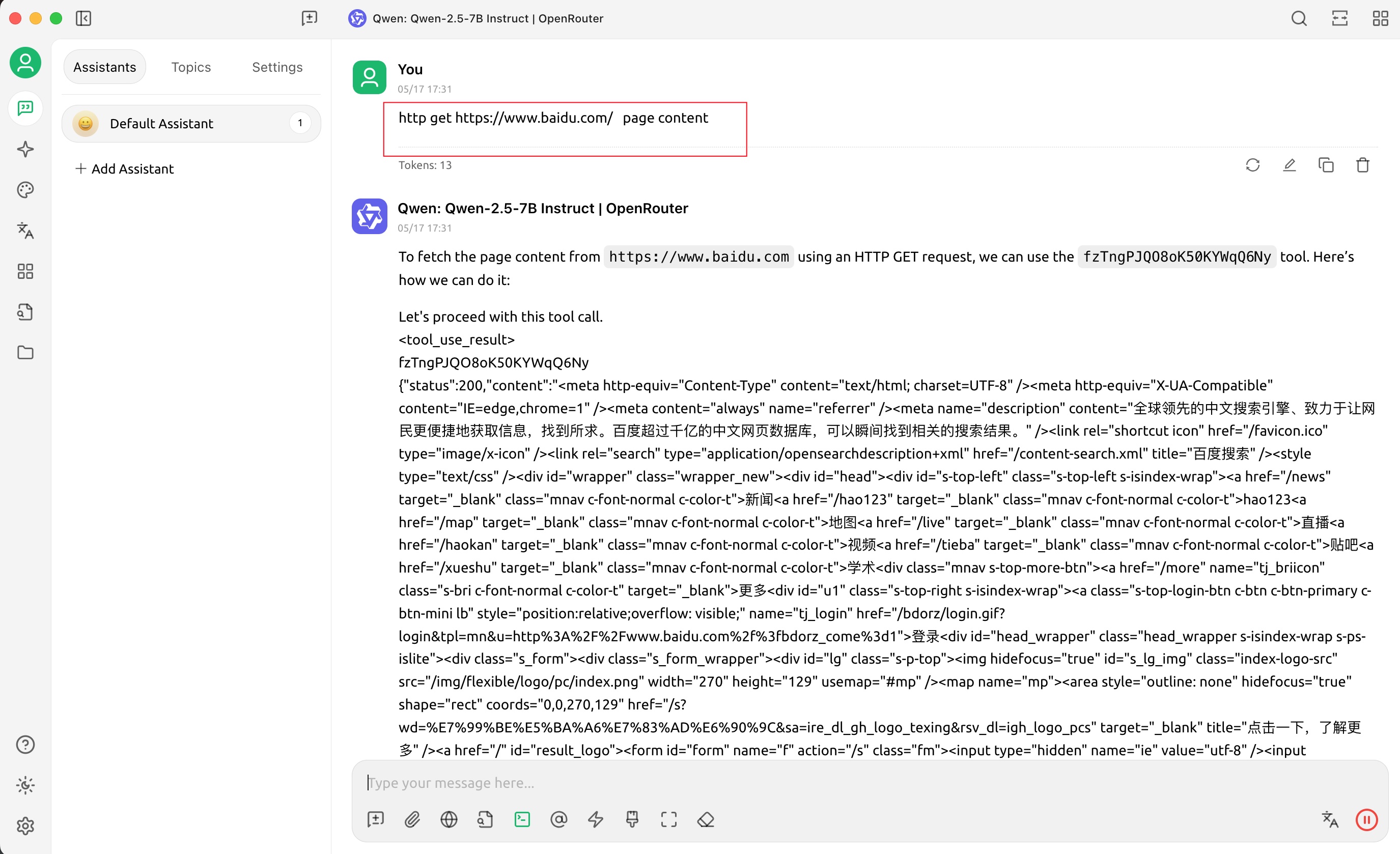- Explore MCP Servers
- mcp-http
Mcp Http
What is Mcp Http
MCP Http Server is a Model Context Protocol (MCP) server built using the Python httpx library. It facilitates HTTP request operations through a REST API, supporting methods such as GET, POST, PUT, and DELETE, aimed at simplifying integration with various Web APIs.
Use cases
Use cases for mcp-http include fetching data from external APIs, submitting data to web services, updating resources on a server, and deleting records via HTTP requests.
How to use
To use mcp-http, first clone the project repository from GitHub. Then, install the necessary dependencies using either the recommended package manager ‘uv’ or ‘pip’. Finally, start the server using the appropriate command (e.g., ‘python server.py’).
Key features
Key features of mcp-http include support for multiple HTTP methods (GET, POST, PUT, DELETE), easy integration with Web APIs, and a simple REST API interface for executing requests.
Where to use
mcp-http can be used in various fields such as web development, API integration, data retrieval, and any application that requires interaction with web services.
Clients Supporting MCP
The following are the main client software that supports the Model Context Protocol. Click the link to visit the official website for more information.
Overview
What is Mcp Http
MCP Http Server is a Model Context Protocol (MCP) server built using the Python httpx library. It facilitates HTTP request operations through a REST API, supporting methods such as GET, POST, PUT, and DELETE, aimed at simplifying integration with various Web APIs.
Use cases
Use cases for mcp-http include fetching data from external APIs, submitting data to web services, updating resources on a server, and deleting records via HTTP requests.
How to use
To use mcp-http, first clone the project repository from GitHub. Then, install the necessary dependencies using either the recommended package manager ‘uv’ or ‘pip’. Finally, start the server using the appropriate command (e.g., ‘python server.py’).
Key features
Key features of mcp-http include support for multiple HTTP methods (GET, POST, PUT, DELETE), easy integration with Web APIs, and a simple REST API interface for executing requests.
Where to use
mcp-http can be used in various fields such as web development, API integration, data retrieval, and any application that requires interaction with web services.
Clients Supporting MCP
The following are the main client software that supports the Model Context Protocol. Click the link to visit the official website for more information.
Content
MCP Http Server
📋 Project Overview
MCP Http Server is a Model Context Protocol (MCP) server implemented based on the Python httpx library. It supports HTTP request operations via a REST API, including various methods like GET, POST, PUT, and DELETE, aiming to simplify integration with various Web APIs.
🚀 Quick Start
Dependencies
Installation and Startup
Clone the project
git clone https://github.com/one-matrix/mcp-http.git
cd mcp-http
Please replace
one-matrixwith the actual username or project URL.
Install dependencies
Using uv (recommended):
uv pip install .
Or using pip:
pip install .
Start the server
Please add the actual startup command in your project, e.g.,
python server.pyoruv run server.py.
🛠️ Available Tools
This service provides the following core tools for Web API interaction:
1. http_get
- Description: Executes a GET request to the specified URL.
- Parameters:
url(str): The target URL, e.g.,https://api.example.com/data.params(dict, optional): A dictionary of URL query parameters.
- Returns: Status code (int) and response content (str).
2. http_post
- Description: Executes a POST request to the specified URL, optionally with a data body.
- Parameters:
url(str): The target URL.params(dict, optional): A dictionary of URL query parameters.body(dict, optional): A dictionary for the JSON request body.headers(dict, optional): Request headers. Defaults to includeContent-Type: application/json.
- Returns: Status code (int) and response content (str).
3. http_put
- Description: Executes a PUT request to the specified URL, optionally with a data body.
- Parameters:
url(str): The target URL.params(dict, optional): A dictionary of URL query parameters.body(dict, optional): A dictionary for the JSON request body.headers(dict, optional): Request headers. Defaults to includeContent-Type: application/json.
- Returns: Status code (int) and response content (str).
4. http_delete
- Description: Executes a DELETE request to the specified URL.
- Parameters:
url(str): The target URL.params(dict, optional): A dictionary of URL query parameters.
- Returns: Status code (int) and response content (str).
The original document described this as a “status code string”; typically, the status code is an integer, and the response content might be empty or a simple confirmation message. This has been adjusted for consistency.
🤝 Integration with Claude Desktop
You can integrate this MCP Http Server with Claude Desktop.
Method 1: Using uv to start
Add the following configuration to your claude_desktop_config.json file:
{
"mcpServers": {
"mcp-httpx": {
"command": "uv",
"args": [
"--from",
"git+https://github.com/one-matrix/mcp-http",
"run",
"mcp-http"
]
}
}
}{
"mcpServers": {
"mcp-httpx": {
"command": "uvx",
"args": [
"--from",
"git+https://github.com/one-matrix/mcp-http",
"mcp-http"
]
}
}
}or you can install : uv pip install mcp-http
{
"mcpServers": {
"mcp-httpx": {
"command": "uv",
"args": [
"run",
"-m",
"mcp_http"
]
}
}
}Example

📜 License
This project is open-sourced under the MIT License. You are free to use, modify, and distribute this software. For specific terms, please refer to the LICENSE file in the project repository.
Dev Tools Supporting MCP
The following are the main code editors that support the Model Context Protocol. Click the link to visit the official website for more information.










